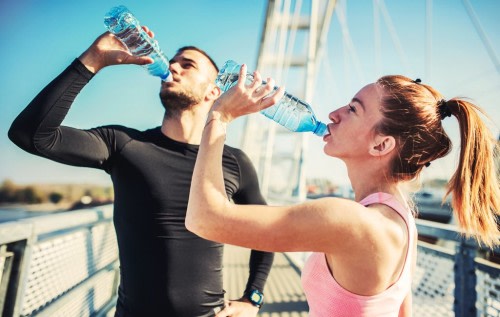Are you feeling fatigued during your workouts? Do you struggle to maintain your energy levels while exercising? If so, you might be overlooking one of the most critical factors in fitness: hydration. In this comprehensive guide, we’ll delve into the importance of staying hydrated during your workouts and how it can significantly impact your fitness journey. Are you ready to unlock the secrets to optimal hydration and peak performance? Let’s dive in!
Understanding Hydration:
Before we explore the role of hydration in fitness, let’s take a moment to understand what hydration is and why it’s crucial for our bodies. Hydration simply refers to the process of providing adequate fluids to the body to maintain its essential functions. Our bodies are composed of approximately 60% water, making it vital for overall health and well-being.
Why is Hydration Important for Fitness?
- Enhances Performance: Proper hydration is essential for optimal athletic performance. Dehydration can lead to decreased endurance, strength, and coordination, making it harder to achieve your fitness goals.
- Regulates Body Temperature: During exercise, your body temperature rises, and sweating is the primary mechanism for cooling down. Sufficient hydration plays a crucial role in regulating your body’s temperature, thus preventing instances of overheating and the onset of heat-related ailments.
- Improves Recovery: Hydration plays a crucial role in post-workout recovery by facilitating the delivery of nutrients to your muscles and removing waste products. Staying hydrated can speed up muscle recovery and reduce the risk of soreness and injury.
Signs of Dehydration:
Wondering if you’re falling short on your water intake? Look out for these telltale signs of dehydration:
- Thirst
- Fatigue
- Headache
- Dizziness
- Dark-colored urine
- Dry mouth and lips
Tips for Staying Hydrated During Workouts:
- Drink Water Regularly: Make it a habit to sip water throughout your workout, rather than waiting until you’re thirsty. Keep a water bottle handy and take frequent breaks to hydrate.
- Monitor Your Fluid Intake: Pay attention to how much water you’re drinking before, during, and after exercise. Aim to consume at least 8-10 glasses of water per day, and increase your intake on days when you’re exercising intensely or in hot weather.
- Choose Electrolyte-Replenishing Drinks: When engaging in prolonged or intense workouts, consider replenishing electrolytes lost through sweat with sports drinks or coconut water. These beverages can help maintain proper hydration levels and replace essential minerals like sodium and potassium.
- Listen to Your Body: Everyone’s hydration needs are different, so pay attention to how your body responds to exercise and adjust your fluid intake accordingly. If you’re feeling thirsty, fatigued, or experiencing any signs of dehydration, drink water immediately.
Hydration and Nutrition:
Did you know that hydration is closely linked to nutrition? What you eat and drink can significantly impact your body’s hydration levels. Here are some dietary tips to support optimal hydration:
- Eat Water-Rich Foods: To enhance your hydration levels, integrate hydrating fruits and vegetables like watermelon, cucumbers, and oranges into your daily diet. These water-rich foods can significantly contribute to keeping you hydrated throughout the day.
- Limit Dehydrating Foods and Beverages: Reduce your intake of caffeinated drinks, alcohol, and sugary beverages, as these can contribute to dehydration.
- Balance Electrolytes: Include foods rich in electrolytes, such as bananas, avocados, and leafy greens, in your meals to support hydration and muscle function.
Water vs Sports Drinks vs Other Liquids:
When it comes to staying hydrated during workouts, the choices can be overwhelming. Let’s explore the pros and cons of water, sports drinks, and other liquids to help you make an informed decision:
-
Water:
-
Pros:
Water is the most natural and accessible hydration option. It’s calorie-free, refreshing, and essential for overall health. Drinking water during exercise helps replace fluids lost through sweating and maintains hydration levels without adding extra calories or sugar.
-
Cons:
While water is sufficient for most moderate-intensity workouts, it may not be enough for prolonged or intense exercise sessions. In such cases, water alone may not adequately replenish electrolytes lost through sweat, potentially leading to dehydration or electrolyte imbalances.
-
Sports Drinks:
-
Pros:
Sports drinks are specifically formulated to replenish fluids, electrolytes, and carbohydrates lost during prolonged or intense physical activity. They typically contain electrolytes like sodium and potassium, which help maintain fluid balance and prevent muscle cramps. Sports drinks can be beneficial for endurance athletes or those exercising in hot conditions for an extended period.
-
Cons:
Unlike water, sports drinks often contain added sugars and calories, which may not be suitable for individuals trying to manage their calorie intake or lose weight. Excessive consumption of sports drinks can contribute to weight gain and dental problems if not consumed in moderation.
-
Other Liquids (e.g., Coconut Water, Fruit Juice):
-
Pros:
Coconut water and fruit juice are natural alternatives to sports drinks, providing hydration along with vitamins, minerals, and antioxidants. Coconut water, in particular, is rich in electrolytes like potassium, making it an excellent choice for replenishing fluids post-workout. Fruit juices can also provide a quick energy boost due to their natural sugars.
-
Cons:
While coconut water and fruit juice offer hydration and some nutritional benefits, they may also contain added sugars and calories. It’s essential to choose unsweetened varieties and consume them in moderation, especially if you’re watching your sugar intake or trying to maintain a healthy weight.
Conclusion:
Hydration is not just a matter of drinking water; it’s a fundamental aspect of fitness and overall health. By prioritizing hydration in your fitness routine, you can enhance your performance, speed up recovery, and minimize the risk of dehydration-related complications. Remember to listen to your body, stay consistent with your fluid intake, and make hydration a top priority in your fitness journey. With the right approach to hydration, you’ll be well on your way to achieving your fitness goals and feeling your best inside and out!

